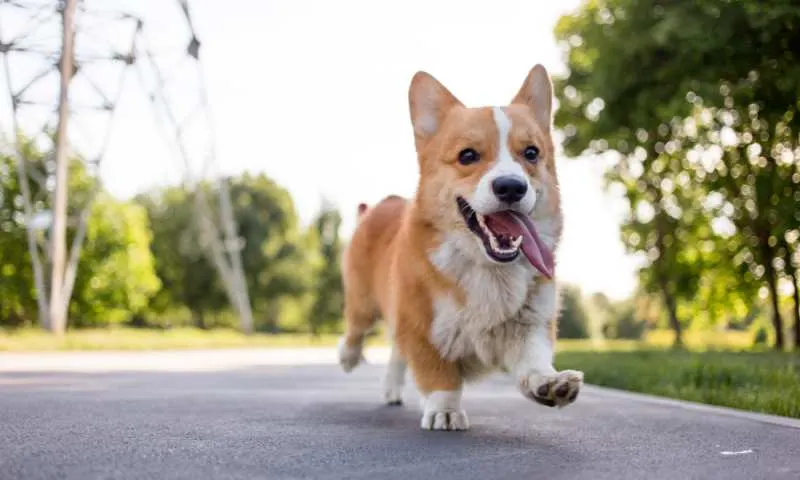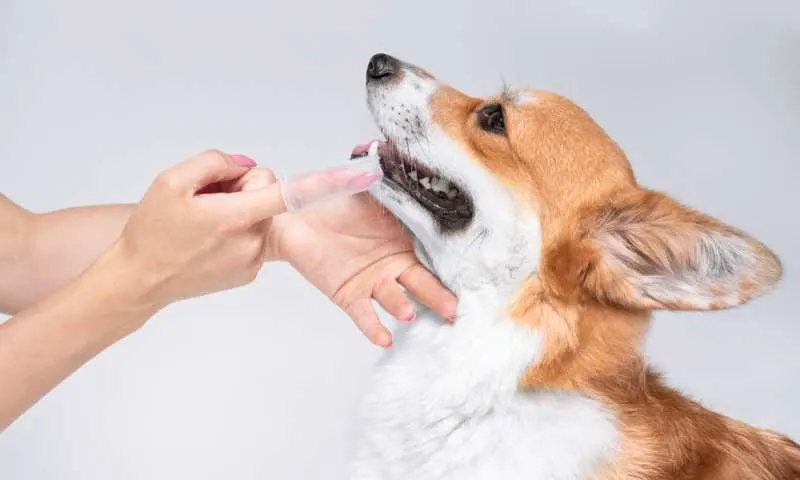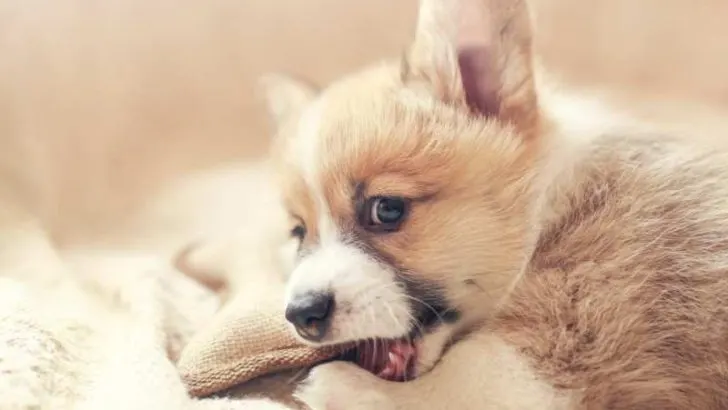It’s time to say a couple of words about the famous teething. So, stay tuned and find out when do corgis teeth, and much more interesting info!
Baby teeth and general dental care can seem complicated to someone who has not had a pet before. It’s not actually, and I’m here to lay down the essential information.
If you have a corgi, you must have wondered about when do corgis lose their baby teeth? Well, it’s a whole process, and you need to be prepared for it. You need to know how to take care of your dog before and after the teething period.
So, continue scrolling, learn everything about corgi teething, how long it takes, and what to do in case of emergencies (such as biting, for example).

Corgi Teething: A Timeline Of Events
2 To 4 Weeks
During the first 4 weeks, your corgi puppy is expected to still be with its mother. The breastfeeding process will still be active, and this is the time when your corgi is just starting to open their eyes properly. Teeth are just beginning to grow at the end of the 4th week.
5 To 6 Weeks
During the 5th and 6th week, all the baby teeth of your corgi should be in place. Dogs generally have about 28 baby teeth. So, how long do corgi puppies teeth? About 2 weeks in total. During this period, the breeder should start weaning the corgi and getting it used to some solid food other than its mother’s milk.
12 To 16 Weeks
After the 8th week, your corgi should be home with you and have a whole set of baby teeth. The growth of your corgi’s teeth can depend on several factors, including the quality of their mother’s breast milk.
Somewhere from the 10th week and until the end of the 12th, you can expect small bits of baby teeth around your house. These baby teeth will look like small pieces of rice, which will leave you wondering, “do corgis have sharp teeth?” Well, in most cases, it’s a yes.
It is very important that the moment you see a loose baby tooth from your corgi, you should remove it immediately. These little bits can be dangerous to your puppy. Corgis are still not adequately trained, and they can easily choke on their own baby teeth.
Up To 6 Months
From the 12th week until the end of the 6th month, your corgi should lose all its baby teeth. This does not happen all at once, but gradually. So, you need to be on the lookout for loose baby teeth around the house, and to check on your corgi puppy regularly.
It’s important to know that not all corgis lose their baby teeth at the same time, so if you were wondering when do corgis stop teething, expect it to be somewhere around the 5th month.
Let’s sum up:
- How long do corgis teeth? It depends on the corgi, but it usually takes about a month.
- When do corgis start teething? They start teething after they are separated from their mother.
A Full Set Of New Teeth
Okay, we’ve answered the questions regarding when do corgis teeth. Now, it’s time to move on.
Adult dogs, that have lost all their baby teeth, have about 42 teeth (that’s 10 more than us). However, one should be careful when it comes to this transition. If you happen to notice that your corgi still has a baby tooth, you should inform your veterinarian about it, and remove the tooth as soon as possible.
In conclusion, by the end of the 6th month, your corgi should lose all its baby teeth.

Dental Care: Essentials
Teething is just one part of the entire dental care of your corgi. There are many more things you need to pay attention to. Nevertheless, your dog’s dental care must always be on point.
So far, we have talked about when corgis start to teeth, but we haven’t mentioned the quality. This is also important. Some owners that had a bad experience with their corgi may start to wonder:
Do Corgis Have Bad Teeth?
Not necessarily. Of course, there are exceptions, but you – the owner – are responsible for the quality of your corgi’s teeth and their care. After losing their baby teeth, it’s time to step up the game and pay special attention.
There are 3 ways to keep your corgi’s teeth healthy and clean. Let’s talk about them for a bit.
1. The First One Is To Brush Them Regularly (Obviously)
Brushing your corgi’s teeth is something you simply must not avoid. It is recommended to brush your corgi’s teeth once a week. This is important because you prevent the development of dental diseases (which we will mention later) and tooth decay.
When you are brushing your corgi’s teeth, take your time and don’t rush it. If your corgi ate more treats this week than usual, don’t hesitate to spend a few extra minutes on dental care.
Also, quality equipment should be used. You should change the toothbrush you use every few months. If you do not do this regularly, you are contributing to your corgi having crooked teeth.
2. The Second One Is Using Dental Chews
Brushing your corgi’s teeth is not the only thing you need to do. This is essential hygiene, but your corgi also needs some dental chews. This is as necessary as a toothbrush.
After your corgi loses its baby teeth, the ones that start growing need to develop properly. This is mainly done by having your corgi chew on anything it sees. But that doesn’t have to be the case.
To encourage healthy growth and development of your corgi’s teeth, you need to go and buy some dental chews. They are not expensive, and you can find them in almost any pet shop. If you’re not sure about how to use them, ask for tips, but you’ll have instructions on the bag.
3. The Third One Is Paying Attention To What Food You Give To Your Corgi
Your corgi’s diet affects many things, and one of them is dental care. So, one should be extra careful when choosing corgi food.
While still in development, dog teeth can be very sensitive and become decayed. Therefore, you should aim at high-quality dog food. I know this may be a little out of the budget, but you’ll save your pet from going to the vet for crooked teeth.
If you are not sure what food you should buy, you can always consult your veterinarian. However, your choices should include foods with lots of proteins, fruits, and vegetables.
Attention! Treats are the most dangerous. Corgis love to eat, but they must be careful when chewing on treats. This can easily speed up the tooth decay process.
To help you understand dental care better, here’s a video on how to brush your corgi’s teeth. Enjoy!
Problems With Bad Breath?
Sometimes, it doesn’t matter how many times you have brushed your corgi’s teeth. Their breath still seems to be bad, and you don’t know what to do about it. There are a couple of reasons why your corgi has problems with bad breath, and some of them are pretty serious. For example, this issue can be the result of:
- Oral hygiene
- Dietary habits and nutrition
- Kidney problems
- Diabetes
- Liver disease
- Foreign substances
As you can see, inadequate dental care can cause a number of problems with your corgi. This can lead to a number of infections that are very painful. And precisely because of this, you need to be vigilant and take your corgi to regular vet check-ups.
For more information on how to help your corgi deal with bad breath, click here.

Problems With Biting
As I already mentioned, the process of tooth development is reflected through biting. Your corgi needs to chew on something, but this can sometimes cross the line and lead to a serious problem.
Constant chewing isn’t healthy, and here are ways in which you can prevent this from crossing the line.
By ignoring your corgi: Corgis do a lot of things just for attention, and biting your slippers can easily fall into that category. However, they can cross the line by doing this. Sometimes, ignoring them will make the biting stop. They will probably move on to another technique, and who knows what that will be.
By redirecting their attention: If you’re in a public place, and your corgi suddenly starts biting something uncontrollably, you can try redirecting its attention. Throw them a toy, or try calling them to come to you.
By consulting a professional: Biting is not uncommon, but sometimes it crosses the line, and someone can end up being hurt. In case this happens to you, redirecting your corgi’s attention or ignoring it won’t help. What you need to do is consult a professional. Your corgi might have to undergo some additional training or corrective behavior methods.
Some owners also rely on common phrases that they use when corgis happen to bite something. For example, you can use:
- Eek!
- Help!
- Ouch!
- Ahh!
- Stop!
- Yikes!
Learn More: How Long Do Corgis Take To Grow? Growth & Weight Chart


